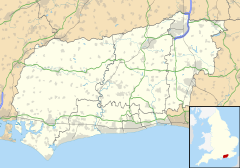Stopham
| Stopham | |
|---|---|
 St Mary the Virgin parish church |
|
| Stopham shown within West Sussex | |
| Area | 3.54 km2 (1.37 sq mi) |
| Population | 87 (2001 Census) |
| • Density | 25/km2 (65/sq mi) |
| OS grid reference | TQ0218 |
| • London | 42 miles (68 km) NNE |
| Civil parish |
|
| District | |
| Shire county | |
| Region | |
| Country | England |
| Sovereign state | United Kingdom |
| Post town | Pulborough |
| Postcode district | RH20 |
| Dialling code | 01798 |
| Police | Sussex |
| Fire | West Sussex |
| Ambulance | South East Coast |
| EU Parliament | South East England |
| UK Parliament | |
Stopham is a hamlet and civil parish in the District of Chichester in West Sussex, England, about 1.5 miles (2.4 km) west of Pulborough on the A283 road. At the 2011 Census the population was included in the civil parish of Fittleworth.
The parish has a land area of 874 acres (354 ha). The 2001 Census recorded 87 people living in 39 households, of whom 40 were economically active.
The Domesday Book of 1086 records a manor of Stopham or Stopeham. The same family, the Bartletts or Barttelots, has held the manor since the Norman Conquest of England. Since 1875 they have been baronets.
Part of the present manor house is dated 1485, but there was a house on the site before that. The house was given a new east front in the 16th century but was partly demolished in 1638. Its plan is E-shaped, a layout popular for Jacobean manor houses. The house is a Grade II* listed building.
The earliest parts of the Church of England parish church of St Mary the Virgin are 11th-century Saxon or Saxo-Norman, and the remainder of the building is 12th-century Norman. New windows were inserted in the chancel in the 13th century and in the nave in the 14th century. The west tower was rebuilt about 1600. The east window of the chancel was inserted in 1638 but is significantly older, having been transferred to its present position from the manor house. The church contains a series of monumental brasses to members of the Barttelot family: three pairs from the 15th century and one set from the early 17th century. The church is a Grade I listed building.
...
Wikipedia

